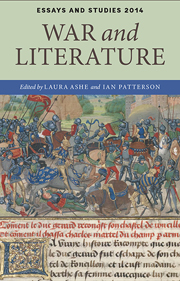Preface
Published online by Cambridge University Press: 05 October 2014
Summary
War was the first subject of literature; at times, war has been its only subject. In this volume, some contributors reflect on whether war will also be the last subject of literature, the reality that defeats representation. Yet if war resists artistic mimesis, it is also dependent upon it. Art's idealisation of war and of warriors, and its subordination of individual lives to an aesthetic of higher ideals, drives the repetitive destruction of people and peoples, of cultural and physical landscapes. Such idealisations are not destroyed by the writing of disillusionment, even when literature seeks directly to condemn conflict. The individual re-emerges in the act of writing, and the author's self-expression becomes ironically heroic, given life and importance by the very conflict it strives to disavow. Indeed, as several of our contributors show, the act of war writing in any context is a conjuration of awe, in which scale tends to overwhelm all clarity of moral judgement. The oppositions presumed to be inherent to war – the two armies or causes; or the corrupt generals and betrayed soldiers; or the distanced attackers and suffering civilians – are mirrored in the ambiguities of war writing, which can never discard either its potential for celebration, in the triumph of literary achievement if nothing else, or its immanent capacity for horror, in the cost to those who lived and died before they were traduced in writing.
- Type
- Chapter
- Information
- War and Literature , pp. xi - xiiPublisher: Boydell & BrewerPrint publication year: 2014

